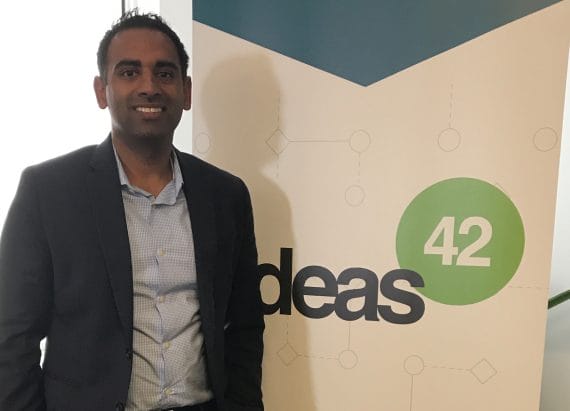ideas42’s network of academic affiliates represent some of the world’s foremost experts in behavioral science. With the ideas42 Affiliate Series, we invite leading scholars to share their insights and what inspires their exploration into human behavior.
Our New York office was pleased to host Mitesh Patel of the University of Pennsylvania. Mitesh studies innovative ways to change health behaviors and improve outcomes by combining digital health approaches with engagement strategies that leverage insights from behavioral economics. He is also Director of the Penn Medicine Nudge Unit, where he leads an initiative within the health care system to systematically test ways to apply insights from behavioral science to choice environments to improve health care value and outcomes. After giving a talk to the ideas42 team, Mitesh was kind enough to share some of his thoughts on behavioral science:
What drew you to behavioral science?
During medical training, I spent countless hours learning the basic science principles of medicine from biochemistry to pharmacology to physiology. But as I shifted from the classroom to caring for patients, I began to see that in many cases, it was ultimately behavior that made the difference. And often, that behavior was surprising suboptimal, both from patients and clinicians. Behavioral science provides a framework to understand how these cognitive biases lead to predictable decision errors and how we could design interventions to address them.
What’s one of the most surprising discoveries about human behavior?
Humans are truly creatures of habit. How those habits form is what often the most revealing about our cognitive biases. Status quo bias, the tendency to follow the default setting, is something that comes up again and again. In many cases, there isn’t much consideration into how the default is set. Default settings exist in a number of contexts and this lack of attention often dictates how we behave.
Tell us about your work in combining behavioral science and technology to improve health outcomes.
In the last decade, there has been a significant effort to increase the adoption of electronic health records by physicians. The way choices are offered and information is framed within these digital environments can significantly influence behavior, but there has not been much systematic testing of different strategies. Our research group works with clinicians and health system leadership to identify opportunities to implement nudges within the health care delivery system to improve health care value and outcomes.
Patients are also increasingly using mobile technologies to monitor their daily health behaviors such as smartphones and wearable devices. For most people, simply using these devices is not enough to change health behaviors. Instead they need to be combined with effective engagement strategies such as financial or social incentives. Our research group runs clinical trials testing these different approaches among high-risk patients.
What have you learned in applying behavioral insights that has changed the way you work?
Many people assume that if an intervention or nudge works in one setting that it will work in all settings, and we find that this is often not true. Even something as simple as default settings depend on how the default is designed. We’ve tested different ways to implement default settings for prescriptions and found dramatically different results. From these experiences, I’ve learned that it is also worth the time and effort to systematically test whether or not an approach works before expanding it further.
How do you use behavioral science in your daily life (or recommend that people use behavioral science in their daily lives)?
One of the advantages of being able to understand cognitive biases is that one can begin to identify habits and decision errors that occur frequently and then leverage that information to make measurable change. I try to focus on behaviors that I want to change by identifying challenges or pitfalls. Then I design a strategy to avoid these situations when possible. However, for many people just knowing what to do is not enough, and so finding ways to use social support or other mechanisms to hold yourself accountable can really help.



